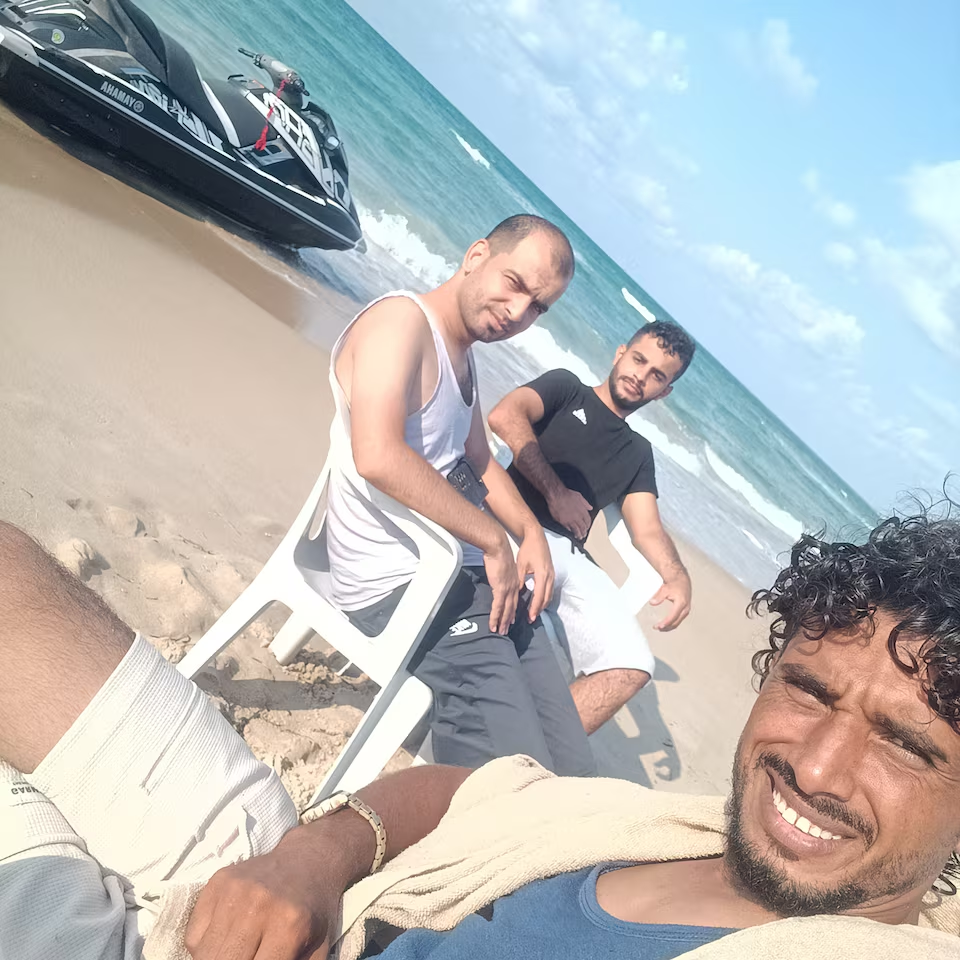News
From Gaza to Europe on a Jet Ski: The Daring Escape of Muhammad Abu Dakha

After more than a year, thousands of dollars, ingenuity, hardship, and the help of a jet ski, 31-year-old Palestinian Muhammad Abu Dakha managed to escape from Gaza and reach Europe.
He documented his journey through videos, photos, and audio files, which he shared with Reuters. Upon arriving in Italy, Reuters interviewed him, his fellow travelers, and his relatives back in Gaza.
Escaping the devastation caused by nearly two years of war between Israel and Hamas—which Gaza’s health authorities say has claimed over 57,000 Palestinian lives—Abu Dakha crossed into Egypt through the Rafah border in April 2024 after paying $5,000.
A Journey Through China and Back
He initially traveled to China, hoping to seek asylum there, but after failing to secure refuge, he returned to Egypt via Malaysia and Indonesia. He showed Reuters email correspondence from August and September 2024 with UNHCR representatives in China.
Afterward, Abu Dakha went to Libya, where human rights groups and UN reports have repeatedly documented abuse and exploitation of thousands of migrants by traffickers and militias as they attempt to secure spots on boats bound for Europe.
According to Italy’s Ministry of the Interior, more than 47,000 migrants have arrived by boat so far this year, mostly from Libya and Tunisia. But Abu Dakha’s journey stands out as extraordinarily perilous.
After ten failed attempts to cross the border with smugglers, he said he bought a used Yamaha jet ski for about $5,000 from an online marketplace in Libya and spent an additional $1,500 on GPS equipment, a satellite phone, life jackets, and other gear.
Along with two other Palestinians—27-year-old Diya and 23-year-old Basem—he rode the jet ski for nearly 12 hours, outmaneuvering a Tunisian patrol boat and towing a smaller craft overloaded with supplies.
The trio calculated their fuel needs using ChatGPT, but still ran out of fuel about 20 kilometers (12 miles) from Lampedusa. They managed to call for help, prompting a rescue operation that saw them land on Italy’s southernmost island on August 18.
A Frontex spokesperson confirmed that a Romanian patrol boat involved in the operation rescued them, describing the event as “an unusual incident.”
“It was a very difficult journey, but we were brave. We were certain we would make it, and God gave us the strength,” Basem told Reuters, declining to share his last name.
“The way they arrived is truly unique,” said Filippo Ungaro, a UNHCR spokesperson in Italy, confirming that officials recorded their arrival after the jet ski journey from Al-Khoms port in Libya and the rescue near Lampedusa.
In a straight line, Al-Khoms is about 350 kilometers from Lampedusa.
Abu Dakha contacted Reuters from a migrant center in Lampedusa after learning from a staff member that local media had reported his jet ski arrival.
He began sharing material and documentation at that time, though Reuters could not independently verify some details of his account.
From Lampedusa to Germany
Their journey continued from Lampedusa. The three were transported by ferry to mainland Sicily and later moved to Genoa in northwest Italy. However, before reaching their final destination, they fled by bus.
An Italian Ministry of Interior spokesperson said they had no specific information about the trio’s activities.
After hiding in bushes for a few hours, Abu Dakha boarded a flight from Genoa to Brussels. He shared his boarding pass with Reuters for a low-cost flight dated August 23 from Genoa to Brussels Charleroi.
From Brussels, he traveled to Germany, first taking a train to Cologne and then continuing to Osnabrück in Lower Saxony, where a relative picked him up and drove him to the nearby town of Bramsche.
He applied for asylum and is currently waiting for his case to be reviewed, though no hearing date has been set. He has no job or income and is staying at a local center for refugees.
Germany’s Federal Office for Migration and Refugees declined to comment on his case, citing privacy reasons.
Meanwhile, his family lives in a tent camp in Khan Yunis, southern Gaza, where their home was destroyed.
Speaking from Gaza, his father, Intesar Khauder Abu Dakha, said, “He had an internet shop, and thank God it was doing well financially and in every way. He had built so much, and it’s all been destroyed.”
Abu Dakha hopes to secure the right to remain in Germany and bring his wife and two young children—aged four and six—with him. One of his children suffers from a neurological condition that requires medical care.
“That’s why I risked my life on the jet ski. Without my family, life has no meaning,” he said.
